七年级下册Unit2Whattimedoyougetup知识讲解与练习
初中英语人教新目标七年级下册Unit 2 Section A预习指导(知识点+练习题)

七年级英语下册Unit 2Section A预习指导一、知识点1.What time “几点钟”用来提问具体的点钟When “什么时候”用来提问任何时间Eg: -- What time is it?= What’s the time?几点了?-- It’s ten o’clock.十点钟。
-- When do you go to school?你什么时候去上学?-- From Monday to Friday.从周一到周五。
2.Get up 起床其反义词为:go to bed 上床睡觉3.Go to school 去上学4.Get dressed 穿衣服Dress (名词) 连衣裙(动词) 穿衣服Put on, wear, dress, in区别:Put on强调穿衣服的动作Eg: It’s cold outside, please put on your sweater.“外面天气冷,请穿上你的毛衣。
”wear强调穿衣服的状态Eg: The girl wears a sweater today.“这个女孩今天穿了一件毛衣。
”Dress 后面接人,表示给某人穿衣服Eg: The boy is too young to dress himself.“这个小那还太小了不能自己穿衣服。
”5.Brush teeth 刷牙(1)Brush (名词) 刷子Eg: Please pass the brush to me.“请把刷子递给我。
”Brush(动词) 刷Eg: The floor is easy to brush clean.“这个地板很容易刷干净。
”(2)Teeth 是tooth(牙齿)的复数形式6.Eat breakfast/lunch/dinner “吃早/午/晚饭”= have breakfast/lunch/dinner注意:在表示吃早午晚饭时不可加冠词,但当有形容词修饰早午晚饭时可加冠词Eg: Have a good breakfast“吃一顿好的早饭”句型:have ...for breakfast/lunch/dinner “早/午/晚饭吃...”Eg: We have bread and milk for breakfast.“我们早饭吃面包和牛奶。
2020年人教新目标英语七年级下册Unit2重点知识总结及单元检测试题(含答案)
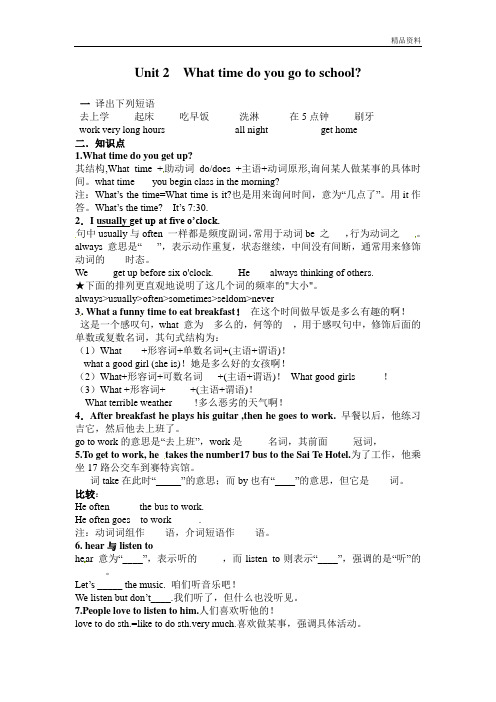
Unit 2 What time do you go to school?一译出下列短语去上学_____起床_____吃早饭______洗淋______在5点钟_____刷牙______ work very long hours______________all night ________ get home_________ 二.知识点1.What time do you get up?其结构,What time +助动词do/does +主语+动词原形,询问某人做某事的具体时间。
what time ___you begin class in the morning?注:What’s the time=What time is it?也是用来询问时间,意为“几点了”。
用it作答。
What’s the time? It’s 7:30.2.I usually get up at five o’clock.句中usually与often 一样都是频度副词,常用于动词be 之___,行为动词之___。
always 意思是“___”,表示动作重复,状态继续,中间没有间断,通常用来修饰动词的____时态。
We ____ get up before six o'clock. He ___ always thinking of others.★下面的排列更直观地说明了这几个词的频率的"大小"。
always>usually>often>sometimes>seldom>never3. What a funny time to eat breakfast!在这个时间做早饭是多么有趣的啊!这是一个感叹句,what 意为多么的,何等的,用于感叹句中,修饰后面的单数或复数名词,其句式结构为:(1)What____+形容词+单数名词+(主语+谓语)!what a good girl (she is)!她是多么好的女孩啊!(2)What+形容词+可数名词___+(主语+谓语)!What good girls _____!(3)What +形容词+_____+(主语+谓语)!What terrible weather ____!多么恶劣的天气啊!4.After breakfast he plays his guitar ,then he goes to work. 早餐以后,他练习吉它,然后他去上班了。
七年级下册Unit2-What-time-do-you-usually-get-up复习要点

Unit 2 What time do you go to school?重点单词,向上,穿衣服连衣裙,刷,牙齿,淋浴淋浴器,通常的,冲动,早, 50,工作,电台车站,夜晚,滑稽可笑的,练习锻炼,最好的,一半半数,晚于,家庭作业,群,生活生命,跑,有时,大量的,打扫,行走,很快的,有------味道?短语归纳1. what time 几点2. go to school 去上学3. get up 起床4. take a shower 洗淋浴5. brush teeth 刷牙6. get to 到达7. do homework 做家庭作业 8. go to work 去上班9. go home 回家10. eat breakfast 吃早饭 11. get dressed 穿上衣服12. get home 到家13. either…or… 要么…要么… 14. go to bed 上床睡觉15. in the morning/ afternoon/ evening 在上午/下午/晚上16. take a walk 散步 17. lots of=a lot of 许多,大量 18. radio station 广播电台19. at night 在晚上20. be late for=arrive late for 迟到◆用法1. at + 具体时间点在几点(几分)2. eat breakfast/ lunch/dinner 吃早饭/午饭/晚饭3. thirty\half past +基数词……点半4. fifteen\a quarter to +基数词差一刻到……点5. take a/an +名词从事……活动6. from …to … 从……到……7. need to do sth 需要做某事重点句子1.你通常几点洗澡?我通常6:40洗澡2.SCOTT有一个有趣的工作. 他在电台工作3.他每天从下午3点工作到6点4.那真是一个滑稽的早饭时间5.我通常早上六点钟锻炼,6.我上班从来不迟到。
初一下册英语Unit2whattimedoyougotoschool知识点练习和答案.doc

教师辅导讲义教学内容新课知识◆短语归纳1. what time 几点2. go to school 去上学3. get up 起床4. take a shower 洗淋浴5. brush teeth 刷牙6. get to 到达7. do homework 做家庭作业 8. go to work 去上班9.go home 回家 10. have/eat breakfast 吃早饭 11. get dressed 穿上衣服12.get home 到家 13. either…or… 要么…要么… 14. go to bed 上床睡觉 15.get dressed 穿上衣服16.go to school 去上学 17.radio station 广播电视台 18. take a walk 散步19. lots of=a lot of 许多,大量 20. at night 在晚上 21. be late for=arrive late for 迟到22.go shopping 去购物 23.go on 继续 24.go back 返回25.go over 仔细检查 25. go away 离开26. in the morning/ afternoon/ evening 在上午/下午/晚上◆用法集萃◆典句必背1. —What time do you usually get up? 你一般什么时候起床?—I usually get up at six thirty. 我通常6:30分起床。
2. That’s a funny time for breakfast. 这是一个可笑的早餐时间。
3. —When do students usually eat dinner? 学生一般在什么时候吃晚饭?—They usually eat dinner at a quarter to seven in the evening.他们经常离七点还有一刻钟(即六点四十五)吃晚饭。
七年级下册Unit2Whattimedoyouusuallygetup复习要点

Unit 2 What time do you go to school?重点单词,向上,穿衣服连衣裙,刷,牙齿,淋浴淋浴器,通常的,冲动,早,50,工作,电台车站,夜晚,滑稽可笑的,练习锻炼,最好的,一半半数,晚于,家庭作业,群,生活生命,跑,有时,大量的,打扫,行走,很快的,有 ------味道?短语归纳1. what time 几点2. go to school 去上学3. get up 起床4. take a shower 洗淋浴5. brush teeth 刷牙6. get to 到达7. do homework 做家庭作业8. go to work 去上班9. go home 回家10. eat breakfast 吃早饭11. get dressed 穿上衣服12. get home 到家13. either ⋯ or要⋯么⋯要么⋯14. go to bed 上床睡觉15. in the morning/ afternoon/ evening 在上午 / 下午 / 晚上16. take a walk 散步17. lots of=a lot of 许多,大量18. radio station 广播电台19. at night 在晚上20. be late for=arrive late for迟到◆用法1. at +具体时间点在几点(几分)2. eat breakfast/ lunch/dinner吃早饭 /午饭/晚饭3. thirty\half past +基数词⋯⋯点半4. fifteen\a quarter to + 基数词差一刻到⋯⋯点5. take a/an + 名词从事⋯⋯活动6. from⋯ to ⋯从⋯⋯到⋯⋯7. need to do sth需要做某事重点句子1.你通常几点洗澡?我通常6:40 洗澡2. SCOTT有一个有趣的工作. 他在电台工作3.他每天从下午 3 点工作到 6 点4.那真是一个滑稽的早饭时间5.我通常早上六点钟锻炼,6.我上班从来不迟到。
Unit 2 知识讲解--度七年级英语下册(人教版)

Unit 2 What time do you go to school?(知识讲解)What time do you get up?你什么时候起床?【知识详解】这是一个由疑问词what time(几点)引导的特殊问句。
其结构:What time +助动词do/does +主语+动词原形,询问某人做某事的具体时间。
例如:what time do you begin class in the morning?你们早晨几点开课?注:What’s the time=What time is it?也是用来询问时间,意为“几点了”。
用it作答。
例如:What’s the time? It’s 7:30.几点了?七点半了。
dress的用法【知识详解】dress作动词意为“穿衣服”,作名词意为“连衣裙”。
本单元词组get dressed表示“穿上衣服”,get是系动词,dressed是形容词,构成系表结构。
【辨析】dress,wear与put ondress 给……穿衣服宾语通常是人,不可以是衣服wear 穿着,戴着宾语是衣帽、饰物等,强调状态put on 穿上,戴上宾语是衣服、鞋帽等,强调动作【例句】She dresses the baby in the morning. 她在早晨给婴儿穿衣服。
He is wearing blue shoes. 他穿着蓝色的鞋子。
Please put on this coat. 请穿上这件大衣。
She goes to the bedroom to get dressed. 她去卧室穿衣服。
【拓展】dress的其他常见用法:① dress up意为“装扮,乔装打扮,穿上盛装”,如dress up for the party“为聚会穿着打扮”;② dress up as意为“装扮成……,打扮成……”,如dress up as a monkey“装扮成猴子”;③ well-dressed意为“穿着考究的,着装得体的”,如a well-dressed lady“一位穿着体面的女士”。
人教版英语七年级下册Unit2 核心句式精讲精练
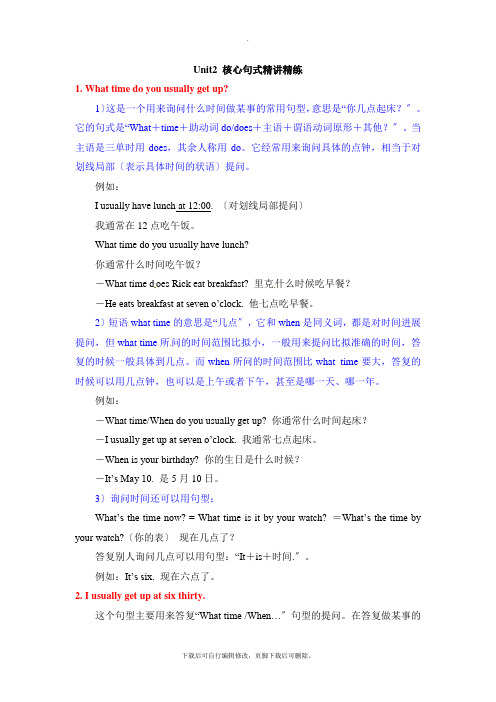
Unit2 核心句式精讲精练1. What time do you usually get up?1〕这是一个用来询问什么时间做某事的常用句型,意思是“你几点起床?〞。
它的句式是“What+time+助动词do/does+主语+谓语动词原形+其他?〞。
当主语是三单时用does,其余人称用do。
它经常用来询问具体的点钟,相当于对划线局部〔表示具体时间的状语〕提问。
例如:I usually have lunch at 12:00. 〔对划线局部提问〕我通常在12点吃午饭。
What time do you usually have lunch?你通常什么时间吃午饭?-What time d oes Rick eat breakfast? 里克什么时候吃早餐?-He eats breakfast at seven o’clock. 他七点吃早餐。
2〕短语what time的意思是“几点〞,它和when是同义词,都是对时间进展提问,但what time所问的时间范围比拟小,一般用来提问比拟准确的时间,答复的时候一般具体到几点。
而when所问的时间范围比what time要大,答复的时候可以用几点钟,也可以是上午或者下午,甚至是哪一天、哪一年。
例如:-What time/When do you usually get up? 你通常什么时间起床?-I usually get up at seven o’clock. 我通常七点起床。
-When is your birthday? 你的生日是什么时候?-It’s May 10. 是5月10日。
3〕询问时间还可以用句型:What’s the time now? = What t ime is it by your watch? =What’s the time by your watch?〔你的表〕现在几点了?答复别人询问几点可以用句型:“It+is+时间.〞。
Unit 2 What time do you get up知识点总结

Unit 2句型1.What time do you usually get up? 你通常几点起床?I get up at six thirty. 我通常六点半起床2. What time does she usually go to school? 她通常何时上学?She usually go to school at around 7:00. 她通常大约7:00去上学。
3. When do your friends exercise? 你的朋友们什么时候锻炼/They always exercise on weekends. 他们总是周末锻炼。
4. when does Scott go to work?斯科特什么时候上班?He always goes to work at 11:00. He is never late.他总是在11点上班。
他从不迟到。
5. In the evening, I either watch TV or play computer games.在晚上,我要么看电视,要么玩电脑游戏。
词组1.get up 起床;站起2.get dressed 穿上衣3.brush teeth 刷牙4. take a shower 洗淋浴5. radio station 广播电6. on weekends (在) 周末7.do one’s homework 做作业8.take a walk 散步;走一走9. eithe r… or…要么……要么……;或者……或者……10.be late for 迟到11. half an hour 半小时12.go to bed 上床睡觉13. go to work 去上班语法1.英语时间的表达(1)采用数词six o’clock (6:00) six thirty (6:30)(2)采用介词past, to 表达时间●当分钟数不超过30分钟(包括30)时,用past表示几点过几分9:30 half past nine thirty past nine●当分钟数大于30分钟时,用to表示“差几分到几点”9:45 fifteen to ten 或 a quarter to ten。
Unit2知识点总结与练习人教版七年级英语下册

Unit2 What time do you go to school?(知识清单)1. get up 起床,反义词go to bed ; up adv.向上,反义词down2. brush v. 刷 brush one’s teeth 刷牙;n. 刷子 复数brushes.tooth n.牙齿,复数teeth ;footfeet ;goose geese(鹅) 3.eat breakfast/lunch/dinner 吃早/午/晚饭 eat=have ,当breakfast 、lunch 、dinner 前有形容词时,要加 a.4.take a shower=have a shower 洗淋浴.5.early adv.早地 提前地,反义词lat e adj.早的 提前的,反义词late.6.an interesting job 一份有趣的工作 be interested in 对…感兴趣7.radio station 广播电台 TV station 电视台 bus station 公共汽车站8.from …to 从…到;从…至. Eg:We work from morning to night.9.at night 在夜里 在夜晚 Eg :We work in the day and sleep at night. 10.o’clock …点钟(用于整点后面) Eg :He gets home at 5:00 o’clock. 11.funny adj.奇怪的,好笑的;fun n.乐趣 快乐 have fun 玩的开心 12.about 大约 左右 ;意为“关于”=on. Eg:This is a book about/on English. 13.be late for=arrive late for …迟到 eg: Don’t be late for/arrive late for school. 14.best 是good 、well 的最高级. Eg: It’s the best time to exercise. 15.a group of 一组 一群 Eg:A group of girls are cleaning the room.16.run v.跑 奔 ; 意为“经营”时 过去式ran ;现在分词running ;名词runner. eg:He runs a big factory. 他经营着一个大工厂。
人教7七年级初一下新版第二单元unit2 what time do you get up讲学稿导学案知识点讲解
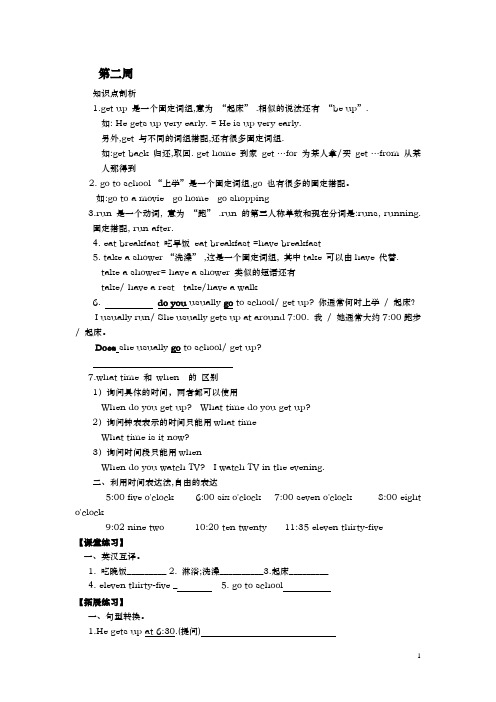
第二周知识点剖析1.get up 是一个固定词组,意为“起床” .相似的说法还有“be up”.如: He gets up very early. = He is up very early.另外,get 与不同的词组搭配,还有很多固定词组.如:get back 归还,取回. get home 到家get …for 为某人拿/买get …from 从某人那得到2. go to school “上学”是一个固定词组,go 也有很多的固定搭配。
如:go to a movie go home go shopping3.run 是一个动词, 意为“跑” .run 的第三人称单数和现在分词是:runs, running.固定搭配, run after.4. eat breakfast 吃早饭eat breakfast =have breakfast5. take a shower “洗澡” ,这是一个固定词组, 其中take 可以由have 代替.take a shower= have a shower 类似的短语还有take/ have a rest take/have a walk6. do you usually go to school/ get up? 你通常何时上学/ 起床?I usually run/ She usually gets up at around 7:00. 我/ 她通常大约7:00跑步/ 起床。
Does she usually go to school/ get up?7.what time 和when 的区别1)询问具体的时间,两者都可以使用When do you get up? What time do you get up?2)询问钟表表示的时间只能用what timeWhat time is it now?3)询问时间段只能用whenWhen do you watch TV? I watch TV in the evening.二、利用时间表达法,自由的表达5:00 five o'clock 6:00 six o'clock 7:00 seven o'clock 8:00 eight o'clock9:02 nine two 10:20 ten twenty 11:35 eleven thirty-five【课堂练习】一、英汉互译。
(2021年整理)七年级下册unit2Whattimedoyougotoschool知识点讲解与练习
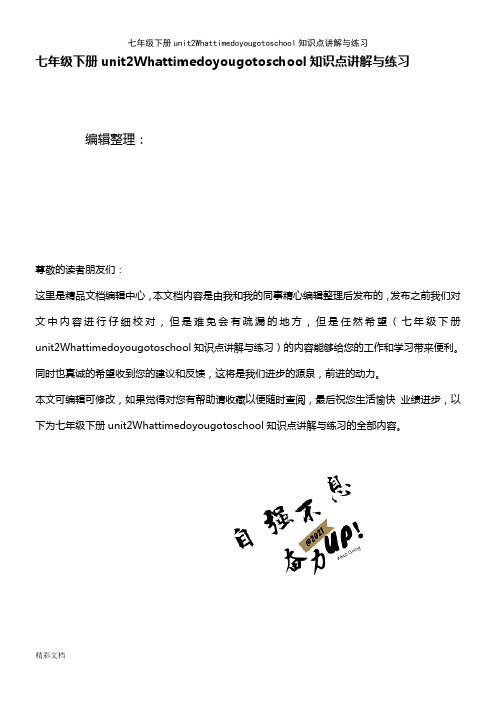
七年级下册unit2Whattimedoyougotoschool知识点讲解与练习编辑整理:尊敬的读者朋友们:这里是精品文档编辑中心,本文档内容是由我和我的同事精心编辑整理后发布的,发布之前我们对文中内容进行仔细校对,但是难免会有疏漏的地方,但是任然希望(七年级下册unit2Whattimedoyougotoschool知识点讲解与练习)的内容能够给您的工作和学习带来便利。
同时也真诚的希望收到您的建议和反馈,这将是我们进步的源泉,前进的动力。
本文可编辑可修改,如果觉得对您有帮助请收藏以便随时查阅,最后祝您生活愉快业绩进步,以下为七年级下册unit2Whattimedoyougotoschool知识点讲解与练习的全部内容。
1.What time do you get up?释:这是一个由疑问词what time(几点)引导的特殊问句.其结构:What time +助动词do/does +主语+动词原形,询问某人做某事的具体时间。
例如:what time do you begin class in the morning?你们早晨几点开课?注:What's the time=What time is it?也是用来询问时间,意为“几点了”。
用it作答。
例如:What's the time? It's 7:30。
几点了?七点半了。
2.I usually get up at five o’clock. 我通常在五点钟起床。
释:1)句中usually与often 一样都是频度副词,常用于动词be 之后,行为动词之前。
always意思是“总是”、“永远”,表示动作重复,状态继续,中间没有间断,通常用来修饰动词的一般时态。
例如:We always get up before six o'clock.我们总是六点前起床。
若修饰动词进行时,则有“老是",“再三地”的意思,带有厌烦、不满、赞美等感情色彩。
(完整版)七年级下册Unit2Whattimedoyougetup知识讲解与练习
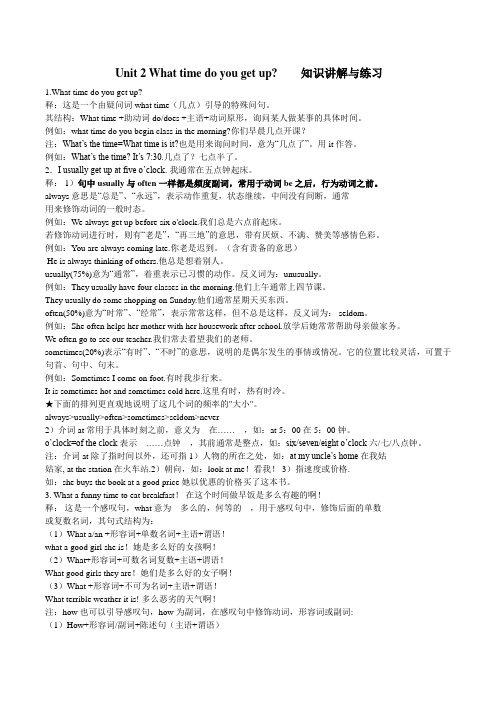
Unit 2 What time do you get up? 知识讲解与练习1.What time do you get up?释:这是一个由疑问词what time(几点)引导的特殊问句。
其结构:What time +助动词do/does +主语+动词原形,询问某人做某事的具体时间。
例如:what time do you begin class in the morning?你们早晨几点开课?注:What’s the time=What time is it?也是用来询问时间,意为“几点了”。
用it作答。
例如:What’s the time? It’s 7:30.几点了?七点半了。
2.I usually get up at five o’clock.我通常在五点钟起床。
释: 1)句中usually与often 一样都是频度副词,常用于动词be 之后,行为动词之前。
always 意思是“总是”、“永远”,表示动作重复,状态继续,中间没有间断,通常用来修饰动词的一般时态。
例如:We always get up before six o'clock.我们总是六点前起床。
若修饰动词进行时,则有“老是”,“再三地”的意思,带有厌烦、不满、赞美等感情色彩。
例如:You are always coming late.你老是迟到。
(含有责备的意思)He is always thinking of others.他总是想着别人。
usually(75%)意为“通常”,着重表示已习惯的动作。
反义词为:unusually。
例如:They usually have four classes in the morning.他们上午通常上四节课。
They usually do some shopping on Sunday.他们通常星期天买东西。
often(50%)意为“时常”、“经常”,表示常常这样,但不总是这样,反义词为: seldom。
人教版七年级下期unit 2知识点小结及练习
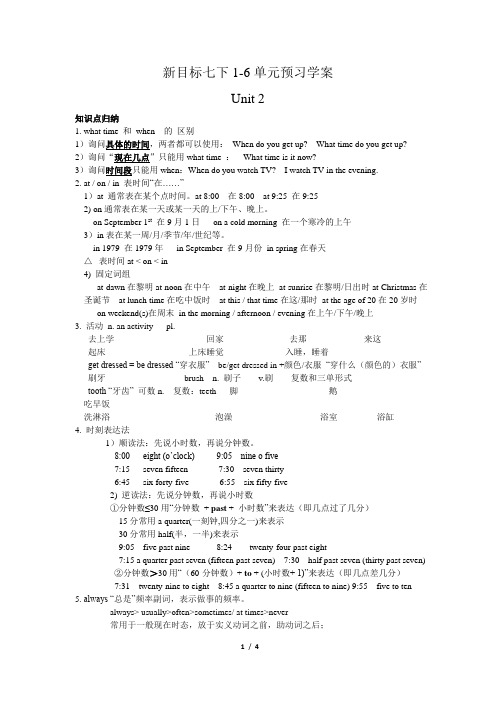
新目标七下1-6单元预习学案Unit 2知识点归纳1. what time 和when 的区别1)询问具体的时间,两者都可以使用:When do you get up? What time do you get up?2)询问“现在几点”只能用what time :What time is it now?3)询问时间段只能用when:When do you watch TV? I watch TV in the evening.2. at / on / in 表时间“在……”1)at 通常表在某个点时间。
at 8:00 在8:00 at 9:25 在9:252) on通常表在某一天或某一天的上/下午、晚上。
on September 1st在9月1日on a cold morning 在一个寒冷的上午3)in表在某一周/月/季节/年/世纪等。
in 1979 在1979年in September 在9月份in spring在春天△表时间at < on < in4) 固定词组at dawn在黎明at noon在中午at night在晚上at sunrise在黎明/日出时at Christmas在圣诞节at lunch time在吃中饭时at this / that time在这/那时at the age of 20在20岁时on weekend(s)在周末in the morning / afternoon / evening在上午/下午/晚上3. 活动n. an activity pl.____________去上学_________________ 回家_____________ 去那___________ 来这_________ 起床_________________ 上床睡觉____________ 入睡,睡着_______________get dressed = be dressed “穿衣服”be/get dressed in +颜色/衣服“穿什么(颜色的)衣服”刷牙______________ brush n. 刷子v.刷复数和三单形式_____________ tooth “牙齿” 可数n. 复数:teeth 脚_________-_________ 鹅__________-________ 吃早饭__________________洗淋浴___________________ 泡澡__________________ 浴室________ 浴缸______ 4. 时刻表达法1)顺读法:先说小时数,再说分钟数。
人教版七年级下册英语Unit2知识点归纳总结和练习(含答案)

Unit2 What time do you go to school?一、词汇集锦get up_______ dress________ get dressed_______ brush________ tooth (pl. teeth)________ shower ______ take a shower_______ usually _______ forty________ never ________ early_______ fifty ________job______ work _______ station_________ radio station__________ o'clock______ night ________ funny________ exercise__________on weekends_________ best _________ group ________ half___________ past _________ quarter __________ homework_______ do (one's) homework _________ run_________ clean__________ walk _________ take a walk________quickly ________ either _________ either…or… _________ lots of ___________ sometimes __________ taste __________ life ________二、短语归纳1. go to school 去上学2. get up 起床3. get dressed 穿衣服4. brush teeth 刷牙5. eat breakfast 吃早饭6. take a shower 洗澡7. what time 什么时间8. at six forty 在六点四十9. an interesting job 一个有趣的工作10. at the radio station 在广播电视台11. usually /always/ often/ sometimes/ never 经常/总是/经常/有时/从不12. your radio show 你的广播节目13. from …..to 从….到…..14. at night 在夜晚15. a funny time 一个有趣的时间16. take exercise 锻炼17. be late for….. 因…迟到18. at about ten twenty 在大约十点二十19. on weekends 在周末20. on school days 在上学日21. half past six 六点半22. a quarter past three 三点过一刻(3:15)23. a quarter to ten 十点差一刻(9:45)24. do (one’s)homework 做(某人的)家庭作业25. take a walk 散步26. go to bed 睡觉27. eat quickly 吃得快28. have much time 有许多时间29. half an hour 半个小时30. get home 到达家31. either…..or 或者…….或者......32. eat a good breakfast 好好吃顿早餐33. lots of = a lot of 许多34. be good for….. 对…….有益35. taste good 尝起来好36. do her homework 做她的家庭作业37. have a healthy life 有一个健康的生活方式38. have dinner 吃晚饭三、句型展示1. What time do you go to school?你几点去上学?2. 一What time do you usually take a shower,Kick?瑞克,你通常几点钟淋浴?—I usually take a shower at six forty.我通常六点四十淋浴。
人教版英语七年级下册单元Unit 2 知识点+测试卷+思维导图

Unit 2 What time do you get to school?1.重点词汇:dress, brush, shower, early, work, exercise, run, walk, either, lot, taste2. 短语归纳:1. what time 几点2. go to school 去上学3. get up 起床4. take a shower 洗淋浴5. brush teeth 刷牙6. get to 到达7. do homework 做家庭作业8. go to work 去上班9. go home 回家10. eat breakfast 吃早饭11. get dressed 穿上衣服12. get home 到家13. either…or… 要么……要么……14. go to bed 上床睡觉15. in the morning/ afternoon/ evening 在上午/下午/晚上16. take a walk 散步17. lots of=a lot of 许多,大量18. radio station 广播电台19. at night 在晚上20. be late for=arrive late for 迟到3. 必背典句:1. -What time do you usually get up?-I usually get up at six thirty.2. That’s a funny time for breakfast.3. -When do students usually eat dinner?-They usually eat dinner at a quarter to seven in the evening.4. In the evening, I either watch TV or play computer games.5. At twelve, she eats lots of fruit and vegetables for lunch.6. She knows it’s not good for her, but it tastes good.7. Here are your clothes.4.语法知识:(1)询问时间when/what time(2)时间表达1. 整点表达法:基数词+ o'clock 表示整点,注意o'clock须用单数,也可以省略。
七下Unit2教师版(讲义练习答案)

Unit 2 What time do you go to school?一、[重点词语]:get up 起床;站起教材原句:What time do you usually get up,Rick?里克,你一般几点起床?常见用法:get up为固定短语,意为“起床”,get sb.up意为“叫某人起床",如果sb.是代词要用其宾格形式get up还有“起立;站起来”的意思,相当于stand up。
例一:The class get up when the teacher es in.老师进来时全班起立。
例二:Can you get me up at six o'clock tomorrow morning?你能明天早上六点叫我起床吗?联想拓展:含有get的其他常见短语get along相处融洽get off下车;离开;下班get back回来get down 写下early adv.&adj.早(的)教材原句:I never get up so early.我从不这么早起床。
常见用法:early既可以作形容词也可以作副词。
作形容词时,可在句中充当表语或名词的定语;作副词时,可作句子的状语。
联想拓展:early的反义词是late,既可以作形容词,也可以作副词,意为“晚(的);迟(的)".例一:I'm never late for work.我上班从不迟到。
例二:Ellen works late again tonight.埃伦今晚又工作到很晚。
job n.工作;职业教材原句:Scott has an interesting job.斯科特有一份有趣的工作。
常见用法:job意为“工作;职业”,是可数名词,其复数形式为jobs。
例一:She wants to find a new job.她想找一份新工作。
exercise v.&n.锻炼;练习教材原句:After that,usually exercise at about ten twenty.在那之后,我通常会在大约十点二十分锻炼。
- 1、下载文档前请自行甄别文档内容的完整性,平台不提供额外的编辑、内容补充、找答案等附加服务。
- 2、"仅部分预览"的文档,不可在线预览部分如存在完整性等问题,可反馈申请退款(可完整预览的文档不适用该条件!)。
- 3、如文档侵犯您的权益,请联系客服反馈,我们会尽快为您处理(人工客服工作时间:9:00-18:30)。
Unit 2 What time do you get up? 知识讲解与练习1.What time do you get up?释:这是一个由疑问词what time(几点)引导的特殊问句。
其结构:What time +助动词do/does +主语+动词原形,询问某人做某事的具体时间。
例如:what time do you begin class in the morning?你们早晨几点开课?注:What’s the time=What time is it?也是用来询问时间,意为“几点了”。
用it作答。
例如:What’s the time? It’s 7:30.几点了?七点半了。
2.I usually get up at five o’clock.我通常在五点钟起床。
释: 1)句中usually与often 一样都是频度副词,常用于动词be 之后,行为动词之前。
always 意思是“总是”、“永远”,表示动作重复,状态继续,中间没有间断,通常用来修饰动词的一般时态。
例如:We always get up before six o'clock.我们总是六点前起床。
若修饰动词进行时,则有“老是”,“再三地”的意思,带有厌烦、不满、赞美等感情色彩。
例如:You are always coming late.你老是迟到。
(含有责备的意思)He is always thinking of others.他总是想着别人。
usually(75%)意为“通常”,着重表示已习惯的动作。
反义词为:unusually。
例如:They usually have four classes in the morning.他们上午通常上四节课。
They usually do some shopping on Sunday.他们通常星期天买东西。
often(50%)意为“时常”、“经常”,表示常常这样,但不总是这样,反义词为: seldom。
例如:She often helps her mother with her housework after school.放学后她常常帮助母亲做家务。
We often go to see our teacher.我们常去看望我们的老师。
sometimes(20%)表示“有时”、“不时”的意思,说明的是偶尔发生的事情或情况。
它的位置比较灵活,可置于句首、句中、句末。
例如:Sometimes I come on foot.有时我步行来。
It is sometimes hot and sometimes cold here.这里有时,热有时冷。
★下面的排列更直观地说明了这几个词的频率的"大小"。
always>usually>often>sometimes>seldom>never2)介词 at 常用于具体时刻之前,意义为在……,如:at 5:00 在5:00钟。
o’clock=of the clock表示……点钟,其前通常是整点,如:six/seven/eight o’clock六/七/八点钟。
注:介词at 除了指时间以外,还可指1)人物的所在之处,如:at my uncle’s home在我姑姑家, at the station 在火车站.2)朝向,如:look at me!看我! 3)指速度或价格.如:she buys the book at a good price 她以优惠的价格买了这本书。
3. What a funny time to eat breakfast!在这个时间做早饭是多么有趣的啊!释:这是一个感叹句,what 意为多么的,何等的,用于感叹句中,修饰后面的单数或复数名词,其句式结构为:(1)What a/an +形容词+单数名词+主语+谓语!what a good girl she is!她是多么好的女孩啊!(2)What+形容词+可数名词复数+主语+谓语!What good girls they are!她们是多么好的女子啊!(3)What +形容词+不可为名词+主语+谓语!What terrible weather it is! 多么恶劣的天气啊!注:how也可以引导感叹句,how 为副词,在感叹句中修饰动词,形容词或副词:(1)How+形容词/副词+陈述句(主语+谓语)How cold it is! 多冷啊! How hard he works! 他工作多么努力啊!(2)How+陈述句(主语+谓语)How he loves his son! 他多么爱他的儿子啊!(3)How+形容词+a/an+单数可数名词+陈述句(主语+谓语)How tall a tree it is! 多么高的一棵树啊!4.After breakfast he plays his guitar ,then he goes to work.早餐以后,他练习吉它,然后他去上班了。
释:1)go to work的意思是“去上班”,work是不可数名词,其前面不加冠词,该短语同go to school“去上学”。
例如:They go to work in their cars = by car. 他们开车去上班。
We go to school by bus.我们乘公共汽车上学。
5.To get to work,he takes the number17 bus to the Sai Te Hotel.为了工作,他乘坐17路公交车到赛特宾馆。
释:动词take在此时“乘坐”的意思;而by也有“乘坐”的意思,但它是介词。
比较:He often takes the bus to work.他经常乘公交车上班。
He often go to work by bus.注:动词词组作谓语,介词短语作状语。
6.He works all night.他工作一整夜。
释:all修饰一个表示时间的单数可数名词,表示整个这一段时间。
例如:Don’t read a ll day.不要整天看书。
He stays at home all morning.他整个上午呆在家。
7.People love to listen to him.人们喜欢听他的!释:love to do sth.=like to do sth.very much.喜欢做某事,强调具体活动。
而love doing sth.=like doing sth. very much则强调习惯。
例如:Do you come out to play with me?你喜欢出来和我玩吗?I like watching TV.我喜欢看电视。
8.hear与listen to释:hear 意为“听见”,表示听的结果,而listen to则表示“听”,强调的是“听”的动作。
如:Let’s listen to the music.咱们听音乐吧!We listen but don’t hear.我们听了,但什么也没听见。
9. He gets home at 7:00,and he watches morning TV.他七点钟回家,然后看早见新闻。
释:1)句中get 意为“到达”,后接地点名词时,要加介词to,后接副词时,不能加to,例如:She gets to school at six o’clock.她六点钟到校。
注: home 是一个副词,所以其前不能加介词to,但home也可作名词,这时其前有物主代词时,可以加to,例如:She gtes to her home at eight o’clock.她8点钟到家。
Can you get there at eight tomorrow morning? 明天上午八点你能到那儿吗?2)句中 morning news 表示早间新闻,其中news 是一个不可数名词。
例如:a piece of news 一条新闻,two pieces of news两条新闻。
Watch……On TV表示通过电视看……节目。
例如:We often watch football game on TV. 我们经常通过电视看是球赛。
10.Can you think what his job is?你能想到他的工作是什么吗?释:这里what his job is表示“他的工作是什么”,其中,what his job I 作think的宾语。
英语中类似的表达很多,它们在句中可充当主语、宾语、表语等。
例如:What she says is very good.她说得很好。
(作主语。
注意,谓语动词要用单数。
)The book is just what you want.这本书正是你想要的。
(作表语)I don't know what you say.我不懂你说的话。
(作宾语)11.What time is it?-几点了?-It’s eight thirty.八点三十分。
释:本句是就具体时刻进行提问的,what time 意为“几点”,这是特殊问句,它的同义句为:What’s the time? /What time is it by your watch? 在回答这个句子时,要用It’s +钟点。
注:英语时刻的表达法:顺读法和逆读法。
顺读法:钟点数+分钟数。
例如:4:25→four twenty-five,6:58→six fifty-eight,7:00→seven o’clock说明:这种表达不论分钟数是多少,均可使用。
逆读法:分钟为+介词to/past+钟点数,可分两种情况:1)分钟为不超过半小时,用分钟数+past(/pa:st/过)+钟点数。
例如:4:23→twenty-three past four,5:19→nineteen past five.2)分钟数超过了半小时,用(所差的)分钟的+to+(下一个)钟点为。
例如:7:31→twenty-nine to eight,10:58→two to eleven说明:在逆读法中分钟数逢“五”逢“十”可省略minute(s)。
否则应加上。
当然,英语习惯上把十五分钟(fifteen)称作一刻a quarter,三十分钟(thirty)称为half/half,因此10:30,可以用两种表达方式,half past ten,ten thirty。
12.Thanks for your letter. 感谢你的来信。
释:thanks for…表示“因…而感谢某人”。
for是介词,后跟名词,代词宾格或者动名词。
例如:Thanks for your help. 感谢你帮助我。
Thanks for telling me the good news.谢谢你告诉我这好消息。
